Sending this toYeastspotting.
Click here for my blog index.
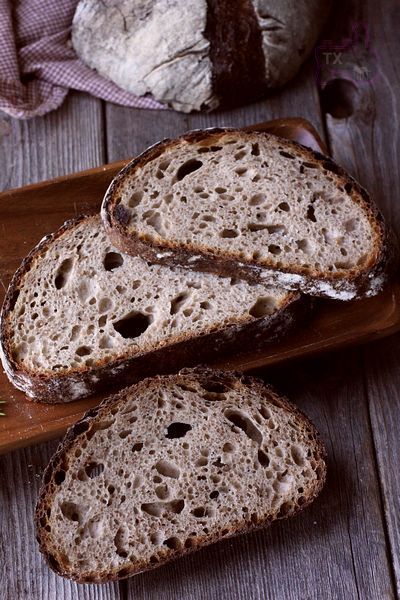
This formula was inspired from a bread in "Bread", however, it's been modified a lot. It's a whole grain heavy loaf with 25% rye flour (all in levain), 25% spelt flour, and 14% rye flakes. The rye flakes were recently "re-discovered" from bottom of the bin, after being soaked in hot water overnight, they added significant moisture to the crumb. Since the levain ratio was much higher than I usually do (25% of flour in levain, comparing to my usual ~15%) and my rye starter is ultra active to start with, bulk rise and proofing were much faster than I expected. I made it a couple times to arrive at the optimal hydration level and fermentation schedule.
- Levain
rye starter (100% hydration), 6g
water, 94g
rye flour, 113g
mix and rise at room temp for 12 hours.
- Soaker
rye flakes, 65g
boiling water, 130g
mix and soak with cover for 12 hours
- Dough
bread flour, 227g
spelt flour, 113g
water, 170g
salt, 8g
levain, all
soaker, all
2. Mix everything together, autolyse for 20 to 30min,mix @ medium speed for 3-4 min until gluten starts to develope.
3. Bulk rise at room temp (~75F) for about 2.5hrs. S&F at 30, 60, 90, 120min.
4. Shape, put in basketes smooth side down, proof for about 1 hour at room temp (the kitchen got pretty warm, about 80F). Score.
5. Bake @ 450F for 15 min with steam, then @430F for 35min. Turn off oven and leave loaf inside for 10-20min with the oven door cracked open. 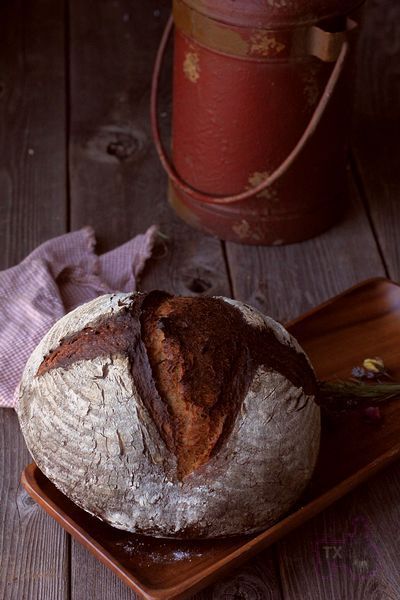
I tend to like a very bold bake, with cracking crust and nice ears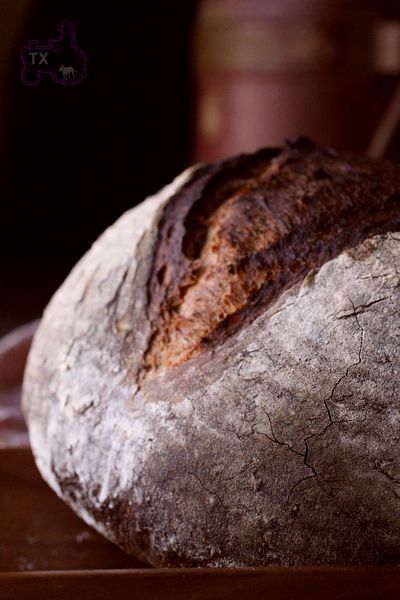
It's fairly tricky to adjust hydration for whole grain heavy loaves. Too much, the relatively weak dough won't hold shape, and crumb would be too wet and sticky; too little it would be dry and crumbly. Took a few tries, but worked out great for this one. Crumb is fairly open for such formulas.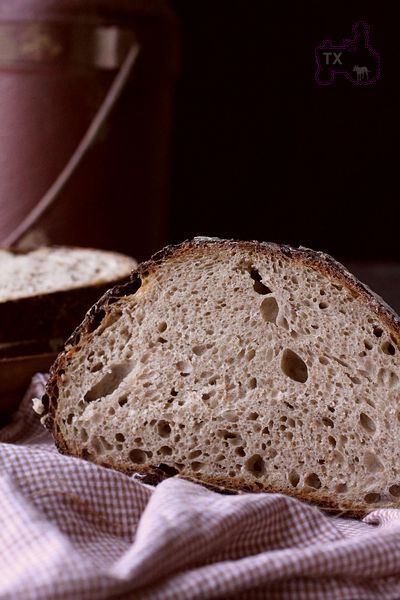
Rye and spelt make a great flavor combo. 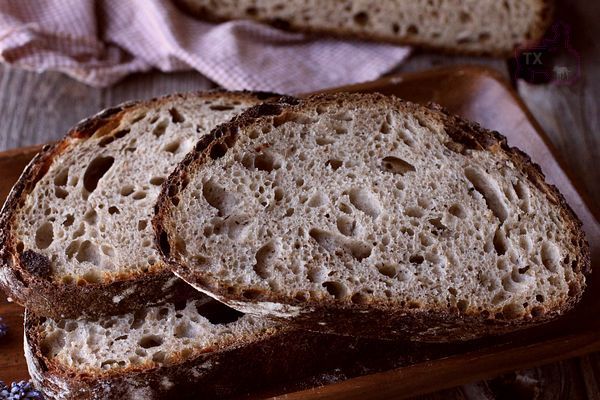
- txfarmer's Blog
- Log in or register to post comments
You certainly caught my attention with rye and spelt (but your beautiful posts always attract my attention!)
Simply Lovely!
I knew this combo was right up to your alley :) Delicious indeed!
melting slowly in the mouth - better than any sweets I can imagine! Beautiful.
Another crust lover I see :)
Beautifully baked loaf txfarmer.
I also enjoy a bold bake ... and this looks perfect. I can just imagine the flavours you achieved with that dark crust and flour combination.
Lovely bread!
Cheers,
Phil
Thanks Phil!
since brown food tastes good as Ann Burrell often notes. This is such a nice looking bread in and out. It has to taste great and the flours used are some of our favorites too.
Nice baking and posting as usual.
Brown food tastes better indeed!
Excellent looking loaf. Love that crust and crumb...beautiful photography as always. I have to make a new rye starter soon and try this formula of yours for sure.
Regards,
Ian
I love my rye starter, maybe even a tad more than my white starter, just maybe ;)
Txfarmer,
I was surprised to read how you mixed and proofed this loaf....No overnight fermenting!
This turned out beautifully and one I will have to try as I like mixing rye and spelt too ever since MiniOven first brought that combo to my attention. This will give me a chance to use my flaker on my rye berries to see how they hold up.
Thanks for idea :-)
Take Care,
Janet
What's a flaker?? Sounds like another gadget I may need to add to my collection.
By the way, DA and I have been discussing flour mills and I believe you have one right?
If so, which model and do you recommend it?
Thanks
Ian
Ian, DA and Txfarmer,
This is the mill I own:
It is a KoMo mill purchased from Pleasant Hill Grain. This LINK will provide more in-depth info for you.
I can not say enough good things about PHG. They are a great company and I can usually find someone knowledgeable to answer my questions should they arise. They are one of the few companies out there that I feel genuinely care about their customers as much AFTER a sale has been made as they do before the sale.
I use to have a NutraMill but after using it awhile it became very cumbersome and was clearly not built to suite my needs. They are great for milling a large quantity of grain in one shot if you only need to mill one time a day. They also do not use stones to grind but I really don't remember how much difference that makes in the long run. (I read all about it when researching but forgot most of what I read after I had made my decision to replace it with the KoMo.)
My baking routine calls for several millings a day. Some larger than others. The beauty of the KoMo mill is there really isn't any clean up. I simply use a pastry brush to dust off the 'shoot' after milling and I am good to go. It is solidly built and a mechanically simple machine to operate. I can take it apart myself and give the stones a cleaning if I so choose. Only a couple of things to go wrong - the on and off switch being the primary one and the starter can easily be accessed and replaced as can the motor if necessary. I am thinking this will never need a replacement motor. It is made in Germany.
The variety of 'grind' is broad. The NutraMill really only grinds grains finely or a bit less finely. This one gives me fine as well as all the way up to really coarse - i.e. almost the whole grain intact. All simply done by merely positioning the grain hopper on top. You can see just how fine the flour is coming out as you grind so can adjust as you go even with the mill running. Very nice when you want to vary consistency in one milling.
As to make and model....Their mills are all basically the same mechanically. It is the housing that is different. They do have smaller mills but I went with the larger capacity one. I chose the PKI because I like the shape. Which is another trivial and personal point of view about this mill. I personally think it looks a lot nicer on my counter than the large plastic NutraMill did....
Ian and DA: This LINK is to the flaker I have. ( I purchased the KoMo FlicFloc). It doesn't get used as much as I though it would. I tend to grind by grains coarse now rather than adding flakes but I do still flake oats once in awhile so it isn't totally un-used. What I found is that grains other than oats tend to crack because they are really hard so the flakes are very brittle and can disappear into nothing when left to ferment overnight in a dough :-O. This would be handy if people here ate a lot of muesli.
Hope this helps. Feel free to ask more questions if I left something out. I know Phil/PiPs and MangoChutney each have one of the mills also though Phil's is a Fidibus which just means it is shaped differently.
For the amount that all of you bake milling makes sense IF you have access to organic or other grains for a reasonable price. (I can get a 50# bag of organic wheat for about $35.00 so that is a huge savings compared to buying milled flour....and the taste - Well, there is just no comparison...fresh is fresh :-)
Have fun and I look forward to hearing what you all do.
Take Care,
Janet
Thanks Janet for the info.
I have been on that site previously and have admired the mill you have. Just not sure for me it is worth the expense. A few months ago I wouldn't have even considered a mill period so I guess once you go in you might as well go all in! I will have to see what I can afford when the time comes. They things of beauty.
Where do you buy your organic grains from?
Thanks again for the in depth info.
Ian
Ian,
If you decide on a mill I second your statement about going all the way in. I would have saved myself several hundred dollars if I had gotten this one first but I didn't and now have 2 mills - one of which I rarely, if ever, use anymore.
I buy all of my grains from a woman who lives about 10 minutes away from where I live. She sells baking equipment out of her garage which includes the grains I purchase. All organic. I am fortunate in that I live in wheat country....grown all around me. I think the rye is the only grain that comes from far away and it is from Canada. I am tres spoiled and I am very grateful for the abundance that surrounds me..
Good Luck,
Janet
You have really given us the low down on two mills. Ian and I have been IM'ing each other with mill reviews, places to buy them etc. You bake every day and have chosen the right mill. If got a KoMo, I too would have to bake every day. Not a bad thing :-) It is such a beautiful piece of kitchen appliance - more like furniture really. I can see it sitting by the KA. Phil uses his as photo backdrop in his posts now and again because it is so beautiful.
Thanks again for your detailed post, it is very helpful.
Mr. D,
You are very welcome :-)
Due to the larger starter ratio, this dough rose much faster than my other doughs, which is one of the reasons why I decided not to do overnight cold proof. Another reason is that my rye starter is pretty sour, with so much of it in the dough, I was worried that overnight proof will make the bread too sour. It works out well with th straight fermentation method though. :)
I see other people have asked below, but I am also curious what mill do you use? What's your experience with it? I am seriously considering....
Yes, overnight ferment with that much leaven would produce SOUR and a weak dough. You were the one from whom I learned the 15% pre fermented flour. Made such a huge difference for me and launched me onto a whole new way of baking with my whole grains :-)
I do the same as you have done when using more leaven or when working with a larger amount of rye sour but find your overnight routine works much better with my daily schedule so that is my go-to routine.
See above comments about the mill.
Janet
txfarmer, what a beautiful boule! Love the way it has bloomed and the dark, cracked crust, so appealing. Looking forward to trying the spelt-rye combo, good to know.
Janet- you have a machine that will press kernels into flakes? That sounds like great fun, you could make spelt flakes, barley flakes, all sorts of stuff. What are your favorites?
It's suprising how these two flours go so well together...
My kitchen is cold in the winter (70°), so I worry that the 1 hour rise will not be enough time. I don't have much experience with whole grains, but I don't think this one is suppose to double? How do I tell how much rise is enough?
Thanks,
Christina
Never follow the clock, you need to touch the dough and feel how much bounce left in the dough. It needs to proof enough but have some lift left in the oven. The only way to master that is practice I am afraid.
Well, then I look forward to practicing. The problem with sourdough is fitting it into my schedule. But, I have a plan.
Christina
Wonderful. I didn't have rye flakes, so I used the rye chips I have--seemed to work fine. Dough was very sticky, but it turned out great. And tastes even better. I'm thinking of adding some toasted walnuts next time.
Definitely a keeper.
Christina
Hello,
today I tried to bake this bread, but after SF as directed, my dough was still lacking the tightness;
was sticky; I made another few SF , but with no good result; gave up and now the dough is rising for one hour in basket;
What am I doing wrong? Or is it suppose to be like that?
Thank you for your answer.